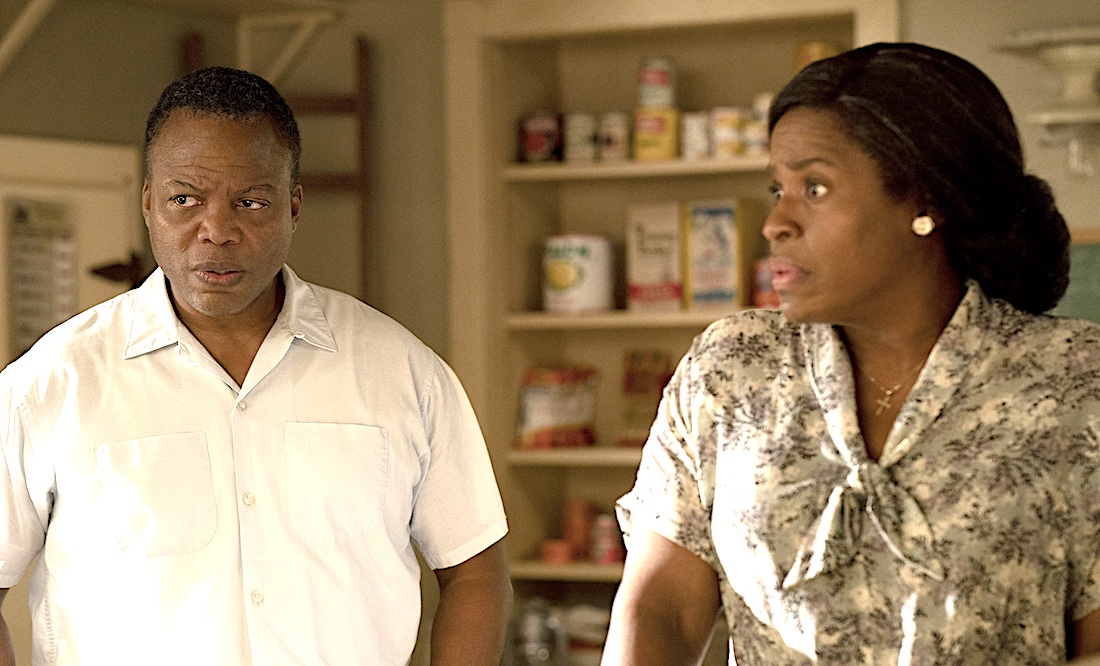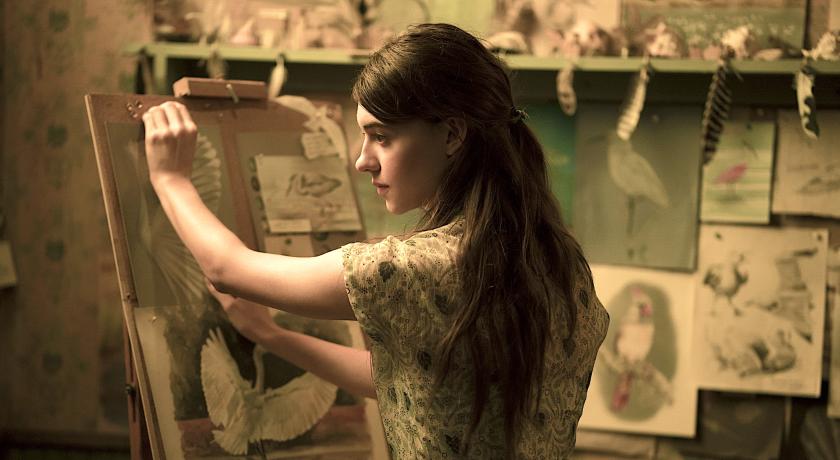Derived from Delia Owens’s massively successful novel, Where the Crawdads Sing is the story of Kya Clark, a girl from an abusive, broken home in the North Carolina marshlands who raises herself almost single-handedly. The few people she encounters during her strange, isolated development from battered girlhood into a fragile young adult dismiss her mockingly as “Marsh Girl”. It’s only the kindly black couple who run the general store in Barkley Cove who take any trouble to get to know her or show any concern for her welfare (pictured below, Sterling Macer Jr as Jumpin' and Michael Hyatt as Mabel).
It’s a narrative that hits several hot buttons – male violence, alcoholism, abuse of women and children and racism, for instance – and Kya’s tale of enforced solitude and social ostracism ought to leave viewers feeling shamed and plunged into self-scrutiny. Unfortunately, director Olivia Newman and screenwriter Lucy Alibar have delivered a film which is superficially pleasing to the eye but never makes its hard-scrabble themes punch home convincingly.
 British actor Daisy Edgar-Jones (familiar from Gentleman Jack and Normal People) plays Kya with sympathy and sensitivity, yet you can never quite equate the remarkably level-headed character she portrays with the hellish experiences she’s been through. It beggars belief, for instance, that her mother and siblings simply abandoned poor young Kya to a hideous fate with her drunk, brutal father, with her hearing nothing from any of them until her brother Jodie suddenly turns up decades later, having spotted a book she’s written in a shop window.
British actor Daisy Edgar-Jones (familiar from Gentleman Jack and Normal People) plays Kya with sympathy and sensitivity, yet you can never quite equate the remarkably level-headed character she portrays with the hellish experiences she’s been through. It beggars belief, for instance, that her mother and siblings simply abandoned poor young Kya to a hideous fate with her drunk, brutal father, with her hearing nothing from any of them until her brother Jodie suddenly turns up decades later, having spotted a book she’s written in a shop window.
Rather than a feral creature of the marshes, she looks like a demure small town girl who wouldn’t stand out in a crowd, not a weird and idiosyncratic force of nature who feels far more empathy with the birds, turtles and crustaceans of the wilderness than with the human society she’s never been a part of. There’s evocative footage of the waterways, marshes and undergrowth, but it’s just scenery, when it ought to have felt like a living, challenging presence.
But we’re supposed to understand that it’s the rawness and infinite mystery of the natural world which has given Kya the strength to survive, embodied in the way she develops into a brilliant writer and illustrator of books about the flora and fauna of the swamps. She grasps implicitly the notions of natural selection and survival of the fittest, which is where she intersects with the film’s parallel theme of the unexplained death of Chase Andrews (Harris Dickinson, pictured below).
 The narrative opens with the discovery of his body in the swamp, after he seemingly fell from a fire-watch tower. With impressively perverse logic, the local sheriff deduces from the complete absence of fingerprints, footprints or any other kind of telltale evidence that Andrews must have been murdered, since the killer had obviously been so meticulous in erasing any trace of their presence. Somebody happened to have overheard Kya yelling at Chase that she’d kill him, and bingo – she lands up in jail on suspicion of murder.
The narrative opens with the discovery of his body in the swamp, after he seemingly fell from a fire-watch tower. With impressively perverse logic, the local sheriff deduces from the complete absence of fingerprints, footprints or any other kind of telltale evidence that Andrews must have been murdered, since the killer had obviously been so meticulous in erasing any trace of their presence. Somebody happened to have overheard Kya yelling at Chase that she’d kill him, and bingo – she lands up in jail on suspicion of murder.
The murder investigation advances intermittently alongside the telling of Kya’s personal history, sometimes going missing for so long that you forget all about it. It at least affords David Strathairn scope to play Kya's kindly liberal-minded defence attorney Tom Milton. Meanwhile, we get to meet the two men who will have a fateful impact on Kya’s life, the decent and clean-cut (if slightly unreliable) Tate (Taylor John Smith), and the aforementioned Chase. The latter’s creepy, overbearing manner tells you all you need to know, like a flashing neon sign pinned to his forehead saying “rapist”.
Sticking to the novel is the best bet, I reckon, since Taylor Swift’s song “Carolina”, played over the closing credits, is the best bit of the film. And you’d think they could at least have explained what a crawdad is and let us hear one singing.















Add comment